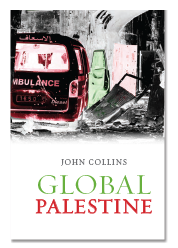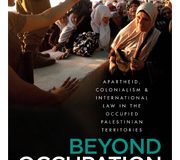The central argument of this book is that the question of Palestine is fundamentally a global question, indeed the global question par excellence. It is apparently a profound mistake to think of what has been going on in that part of the world as a conflict between two sides, each with legitimate claims.
There is no conflict, this book asserts, but rather a structural problem – for the Palestinians as the displaced indigenous people of the region and, by example and extension, for the peoples of the rest of the globe – in Israel’s existence. The creation and continuing existence of a Jewish state is as illegitimate as the South Africa where apartheid was institutionalised in the same year, 1948 (not, we are given to believe, accidentally).
The assertion that Zionism is an example (perhaps the perfect example) of settler-colonialism has now sadly become part of the common sense of many supposed radicals today. Collins gives the concept a new twist by differentiating between three ‘modes’ of settler-colonialism: ‘exocolonisation’ (the politics of territorial control), ‘endocolonisation’ (which is ‘inwardly directed’) and, even more pompously, ‘dromocolonisation,’ which apparently has something to do with acceleration, but later turns out largely to refer to the rapidity with which Israeli forces can react to (always legitimate) Palestinian resistance. These terms do little to hide the obvious problems with this line of argument. Jews did not go to Israel as agents of Western imperialism; the creation of the State of Israel was a response to the greatest catastrophe that Jews had experienced in their long and often bitter history – the radicalisation of antisemitism that drove the Nazis to attempt to eliminate the Jewish people as a whole.
Any serious consideration of antisemitism is, however, entirely absent from this book. If it is mentioned at all, it is dismissed from serious consideration, deployed only to further vilify Israelis who are supposed to have ‘internalised’ it, as they apparently seek to become Europeans themselves. Any fear Israelis have of being attacked is dismissed as groundless; a mere ‘artefact of mass political psychology,’ the result of the construction of imaginary threats that are used to justify an infinitely malleable policy of constructing internal and external enemies to be contained, policed or eliminated. Settler colonialism, it seems, always requires a complementary ‘securitisation’ process; an apparent ‘obsessive pursuit’ of a security that can never be achieved.
Attacks on Israelis – including in the form of suicide bombing, here justified as a necessary way of making the politics of settler-colonialism ‘visible’ – are always legitimate resistance to what is said to be either Israeli ‘genocide’ or ‘politicide.’ The former term is proposed but never discussed, which is not surprising as there is not a shred of evidence to support it.
Its casual use here, as elsewhere, is a vicious abuse of a concept first developed by the great Polish Jewish jurist Raphael Lemkin, as he struggled to get the newly formed United Nations to agree a Convention on Genocide after the Second World War and so come to terms with what had happened to… the Jews. The term ‘politicide’ was, for its part, constructed to deal with a problem posed by the way the concept of genocide had been limited in the Genocide Convention in order to exclude the mass killing of people on political grounds. Its application to the Palestinian case is also viciously inappropriate, since there is no evidence whatsoever of any intent (as specifically required by the Convention) on the part of the Israeli state to murder large numbers of Palestinians. On the other hand, the desire of some to eliminate the State of Israel, would, if implemented, have murderous consequences for the large number of Jews who live there.
Such a possibility is airily dismissed by Collins who romanticises all forms of Palestinian resistance. The Palestinians, we are told, are the ‘poets – and prophets – of the age of “shock and awe”.’ If only the Israelis could appreciate this, they might be able to wean themselves off their force-fed anxieties and become indigenous citizens of a multi-cultural society; dismantling the structures of settler colonialism and liberating the imaginations of post-colonial subjects everywhere. A crucial part in making all this happen, we are told, is played by a solidarity movement which must be global in reach, ambition and mode of operation – as the struggle for Palestine is nothing less than the key cause of our times.
In one way, sadly, this book does capture something of what is going on today, which is that quite significant numbers of people who like to think of themselves as radical have managed to persuade themselves that the cause of the Palestinians is indeed the most important one in the world today. The Sri Lankan government (to give only one example) can murder around 40,000 Tamils in a month (a conservative estimate), without any sign of international solidarity with the victims of one of the most blatant crimes against humanity (if not genocide) seen in recent years, let alone disturbing the hierarchy of injustice proposed here.
But the problem is not really one of ranking as such. The ranking derives from a depiction (it is not a serious analysis) of the conflict over Israel/Palestine in entirely one-sided terms. If all the evil is on one side, if Israel (or Israel and America) is presented as a global threat, a threat to everyone else, there is no possibility of thinking at all. Thinking requires one to think about the other not as an inherently (structurally) mortal threat but as a set of fellow human beings, who may be right about some things and wrong about others. The arguments (such as they are) presented here do not allow for this. They are Manichean and totalitarian, allowing for no real complexity, no dialogue, debate or negotiation, since they imply that anyone who thinks that Jews might have any serious reason for thinking or feeling as they do, for wanting to have their own state given their history, is a fool or a knave. To the extent that the arguments presented in this dismal book already command some support, they are part of a much deeper problem, to which they not only offer no solution but which they can only make worse.






































Odd how those objecting to settler colonialisst states never swipe at all the states of the Americas and Australia, New Zealand and South Africa in which last the Bantu tribes were as much immigrants as the whites!
Time to remember that between the fall of Rome and the rise of Spain and Britain the imperialists and settler colonialists were the Arabs and oher Moslems: Turks in the Balkans and the Mogulss in India – only they are so much part of the political wallpaper that people forget about how they rubbed out pre-islamic civilisations, languages and religion.